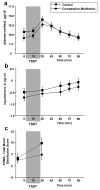Effect of compassion meditation on neuroendocrine, innate immune and behavioral responses to psychosocial stress
- PMID: 18835662
- PMCID: PMC2695992
- DOI: 10.1016/j.psyneuen.2008.08.011
Effect of compassion meditation on neuroendocrine, innate immune and behavioral responses to psychosocial stress
Abstract
Meditation practices may impact physiological pathways that are modulated by stress and relevant to disease. While much attention has been paid to meditation practices that emphasize calming the mind, improving focused attention, or developing mindfulness, less is known about meditation practices that foster compassion. Accordingly, the current study examined the effect of compassion meditation on innate immune, neuroendocrine and behavioral responses to psychosocial stress and evaluated the degree to which engagement in meditation practice influenced stress reactivity. Sixty-one healthy adults were randomized to 6 weeks of training in compassion meditation (n=33) or participation in a health discussion control group (n=28) followed by exposure to a standardized laboratory stressor (Trier social stress test [TSST]). Physiologic and behavioral responses to the TSST were determined by repeated assessments of plasma concentrations of interleukin (IL)-6 and cortisol as well as total distress scores on the Profile of Mood States (POMS). No main effect of group assignment on TSST responses was found for IL-6, cortisol or POMS scores. However, within the meditation group, increased meditation practice was correlated with decreased TSST-induced IL-6 (r(p)=-0.46, p=0.008) and POMS distress scores (r(p)=-0.43, p=0.014). Moreover, individuals with meditation practice times above the median exhibited lower TSST-induced IL-6 and POMS distress scores compared to individuals below the median, who did not differ from controls. These data suggest that engagement in compassion meditation may reduce stress-induced immune and behavioral responses, although future studies are required to determine whether individuals who engage in compassion meditation techniques are more likely to exhibit reduced stress reactivity.
Figures






References
-
- Aggarwal BB, Shishodia S, Sandur SK, Pandey MK, Sethi G. Inflammation and cancer: How hot is the link? Biochem Pharmacol. 2006;72:1605–1621. - PubMed
-
- Bierhaus A, Wolf J, Andrassy M, Rohleder N, Humpert PM, Petrov D, Ferstl R, von Eynatten M, Wendt T, Rudofsky G, Joswig M, Morcos M, Schwaninger M, McEwen B, Kirschbaum C, Nawroth PP. A mechanism converting psychosocial stress into mononuclear cell activation. Proc Natl Acad Sci USA. 2003;100:1920–1925. - PMC - PubMed
-
- Bower JE, Ganz PA, Aziz N, Olmstead R, Irwin MR, Cole SW. Inflammatory responses to psychological stress in fatigued breast cancer survivors: Relationship to glucocorticoids. Brain Behav Immun. 2007;21:251–258. - PubMed
-
- Byrom B, Stein D, Griest J. A hotline to better data. Good Clinical Practice Journal. 2005;12:1–4.
-
- Carlson LE, Speca M, Patel KD, Faris P. One year pre-post intervention follow-up of psychological, immune, endocrine and blood pressure outcomes of mindfulness-based stress reduction (MBSR) in breast and prostate cancer outpatients. Brain Behav Immun. 2007;21:1038–1049. - PubMed
Publication types
MeSH terms
Substances
Grants and funding
LinkOut - more resources
Full Text Sources
Medical

